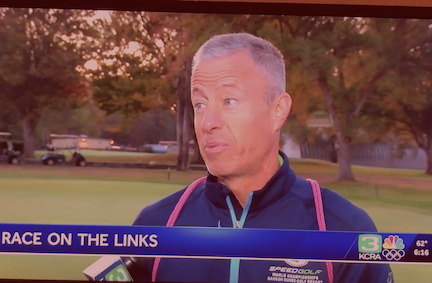If you want to be your best in fitness and in life, get help from experts. I have tended to do a lot of self-coaching in endurance running, triathlon, speedgolf and sprinting and high jumping in my career, and it has not been easy. I guess my personality tends that way, and also I can sense when structured environments are not a good fit.
Since I started so early on the pro triathlon circuit, there really were no experts on training except for my fellow elite athletes. We learned a lot from each other and basically we’re engaging in decades of experimentation. I think that’s one reason why the performances continue to escalate to mind-boggling levels today.
Nowadays, I get support from a variety of experts. I’m especially appreciative of my mentors in masters track and field sprinting and jumping, because I have minimal experience in the high intensity realm. Listen to fantastic B.rad podcast guests, Cynthia Monteleone (@fastover40), Sue McDonald (@suemcdonaldfitness), Lion Martinez (@thelionmartinez), and Troy Haines (@skyhiandflyjumplab) for great insights.
One insight I’m trying to embrace is to train and rest like a sprinter. Endurance athletes like to put in work, log the miles, and take “easy” days where you still bag time on the heart. My sprinting and jumping workouts are grueling, and have a high impact on the joints. This means I require more down time, PT prehab, and rehab. I discussed this concept in my episode about how (and why) I am now taking days off, explaining how I reached out to Cynthia, saying, “Hey, I need even more help from you.” I have been consulting with her for a long time, and when I turned over my precious training log information to her, she pulled out some really strong and amazing insights from it—one of them being that I wasn’t taking enough true rest and recovery days. This was a massively helpful revelation for me. Through Cynthia’s insights, I realized the more refined and lofty your goals become, the more focused you have to become (obviously). I started thinking of athletes operating at the highest level, such as the Tour de France riders, who are likely not in the gym trying to set new personal bests in the powerlifting categories. Nor are they playing flag football on the weekends with their families or trying to enter an open water swim event.
The endurance mentality often emphasizes pushing through discomfort and accepting exhaustion as a natural part of the process. Suffering becomes a badge of honor, a symbol of dedication. However, the high-performance mentality, especially in sprinting and jumping, focuses on precision and quality over quantity. It’s not about how much time you spend or how much you can endure—it’s about honing your technique, making each movement as efficient and effective as possible. This approach helps you avoid burnout and injury by prioritizing rest, recovery, and the intelligent application of effort. True high performance is not about reaching exhaustion but about mastering the mechanics and pushing the limits of what’s possible with speed, power, and control.
When I interviewed Lion Martinez, he brought up the concept of the fitness fatigue paradigm—the idea that if you train, your fitness is going to go up, but, your fatigue goes up too. Lion said: “At some point you cannot train anymore, or the body’s going to adapt in ways you don’t want for your sport.” He added that as you are training, you are building components that are going to help you for your sport—but this also means you are signaling to your body from your brain that you need more recovery, and that means more oxygen to support slow-twitch muscle fibers. As Lion explained in the show, this means that: “You’re actually preparing yourself for doing less high-intensity work, as a result, your body’s going to get worse at handling a lot of high intensity work, like sprinting or lifting. Basically, as you’re getting less performance based, you’re becoming more survival based.” This also means that if you are a sprinter or a thrower (two very explosive activities), if you add a lot of volume to your training regimen, you are going to get slower, because your body does not want to get injured—simple as that.
My show with Lion is a great resource for athletes and fitness enthusiasts as he is such a knowledgeable source of information, and one thing I really appreciated from our conversation were the non-physical takeaways that you don’t always hear from coaches. Lion brought up the important point that there are different types of fatigue—we all have muscle fibers that can get broken down and cause micro damage to the body, but another, very underrated aspect of training is being mindful of another kind of fatigue: emotional and mental fatigue. Lion explained that, as a coach, if he has an athlete that comes in and starts talking about how bad their relationship is, or if they’re stressed at work or brings up anything similar, he cannot run that athlete as hard because it’s going to negatively affect them. “We have to manage all these things,” Lion explained, adding that if you build a system, you must remain adaptive within that system, so you are always aware of when you need to ease up, where you can increase your efforts, and so on.
This is the difference between working hard and working with intention. It’s easy to get caught in the loop of grinding—showing up every day, logging hours, checking boxes. That kind of discipline has value, but it can also become a trap. I loved the answer Sue gave me when I asked her about her current training regimen: “It’s pretty boring.” For Sue, “boring” means training is all about consistency and trying to stay injury free—which happens to be my number one goal as well. One of the most valuable things I have learned over the years is that sometimes the best thing you can do for your performance is not train, but instead pause, rest, recover and reflect. To remember the importance of seeing what people you trust are doing, to read the research, and to be deliberate about seeking out support and answers for experts in their field. It’s a very different kind of discipline—one that demands restraint, trust, and patience. But when you get it right, the results are explosive.






